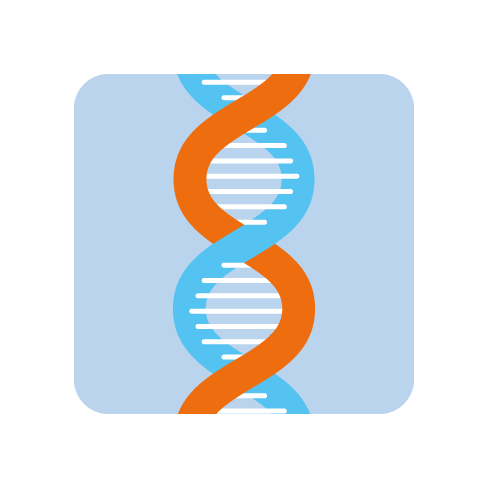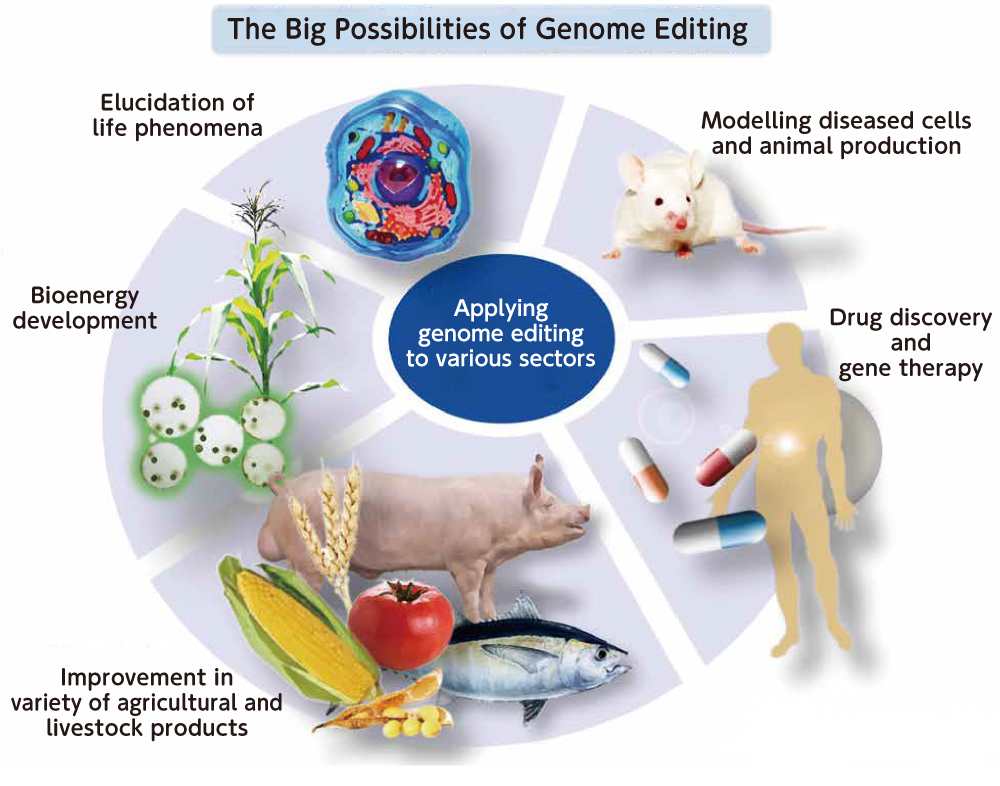 life sciences
life sciences healthcare
healthcare AI・IoT・robotics
AI・IoT・robotics education
education environment・energy
environment・energy food・agriculture
food・agriculture material
material


Research Background
Genome editing is a recent biotechnology that allows genetic information (genomes) to accurately change. With genome editing, a person’s DNA cleaving enzyme (the genome-editing tool) is created. We aim for intracellular DNA and cut it out. The human genome has about 3 billion nucleotide sequences (A, G, C, T) of information contained in it. But with genome editing, you can cut out a specific part. Cut DNA may quickly repair itself depending on the multiple intracellular systems, but genome editing uses this repairing process to accurately alter genes. Similar to a natural mutation, genome editing can go from microbes to animals and plants. It is an innovative technology that is expected to achieve results in using micro-organisms for biofuel development, improve useful varieties of those micro-organisms that can be applied to drug discovery and the pharmaceutical field.

Research Contents
At Hiroshima University, we began developing the basic technologies for genome editing in 2008. Since then, we have announced many research results. We use a uniquely developed genome-editing tool (Platinum TALEN) to edit the genomes of micro-organisms, insects, sea urchins, frogs, newts, and other amphibians and mammals. Furthermore, as this technology improves, the workings of genes inside cells can be regulated and imaging can proceed.

Genome editing is expected to be applied from basic research to a wide range of sectors (biofuel development with algae, improvement of useful varieties, drug discovery, and gene therapy).
The Image of Social Implementation and Corporate Tie-ups
Hiroshima University, a leading genome-editing research institute, formed the Genome Editing Industry-Academia Collaborative Consortium in 2016. Thanks to the participation of many businesses, industrial technology development is progressing. Using microalgae in the gene-editing process, development of renewable fuels alternative to fossil fuels is progressing. In the medical field, to further genetic disease research, we made an iPS cell model and an animal model and have continued our work with researchers from here and abroad. Genome editing has high utility value when it comes to medical treatment. We are putting our energy into technological development that will further regenerative medicine and cell preparation for treating cancer.
http://www.mls.sci.hiroshima-u.ac.jp/smg/opera/index.html
Hiroshima University was chosen for the WISE Program (doctoral program for World Leading Innovative & Smart Education, which cultivates leading genome editors) by the Ministry of Education, Culture, Sports, Science and Technology (MEXT). Here, people learn from the basics of genome editing to the background of various applications, developing researchers who can create new industries and develop new industrial technologies.
https://genome.hiroshima-u.ac.jp/
To create new industries that use genome-editing techniques requires more than the basic knowhow of genome editing. Knowledge of the target organism and the substance to be produced is also necessary. At Hiroshima University, we are able to arrange for researchers that are not only genome editors, but also the type that can help with creating new industries. When it comes to social implementation, actual experience is necessary in a field segregated from the natural environment. The Hiroshima University east campus, one of the largest in Japan, has the activity and the local autonomy to cooperate with businesses. Its environment makes it easy for businesses to work in. Also, our policy is to aggressively build a genome-editing database for the advance of bio-informatics, which will be increasingly important in the future.
For companies interested in the above project, please contact us from the link below.
After graduating from the Hiroshima University F aculty of Sciences in Department of Biology and Zoological Sciences, and dropping out of the same university’s doctoral program at the same university, he became an assistant teacher at Kumamoto University Faculty of Sciences and received his doctoral degree in science there. After serving as a lecturer and assistant professor at the Hiroshima University Graduate School of Sciences, he has been in his current position since 2004. His specialty is genome biology. The theme of his research is “Genome Editing Technology Development and Application”, which can use a wide range of organisms. He also serves as the chief of the Hiroshima University Genome Editing Innovation Center, and the chairman of the Japan Genome Editing Institute. He has published a book called “Basic Principles and Application of Genome Editing” (Shokabo).

In 2008, he graduated from Hiroshima University Faculty of Sciences. In 2012, he completed the doctoral course at Hiroshima University Graduate School of Science Research. His PhD is in science. In 2012, He became a s pecial researcher (PD) at the Japan Society for the Promotion of Science. In 2013, he became a specially appointed teaching assistant at the Hiroshima University Graduate School. In 2015, he became a specially appointed lecturer at the same school. In 2018, he became a lecturer at the same university. From 2020, he has been an associate professor. In 2018, he was certified as a distinguished researcher by Hiroshima University. His specialty is genome bioengineering. His research theme is development of genome editing and related technology and the application of that technology to a variety of cells and organisms.
